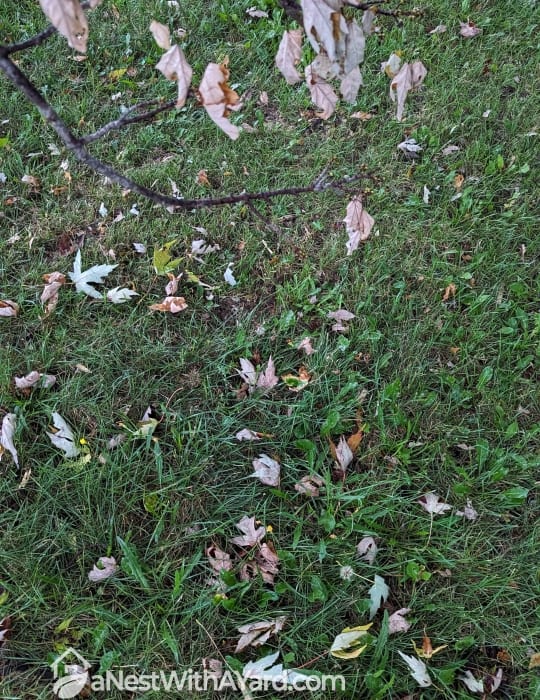Leaves are not good for your grass if they cover a significant portion of your lawn for a prolonged period of time. Fallen leaves can smother your grass and inhibit its growth in spring. They attract pests and promote snow mold diseases too.
Every fall season, you may find that one question keeps popping up: Do you have to remove all the leaves from your lawn, or is leaving them sometimes OK? I am sorry to be the bearer of bad news, but fall cleanup is a must!
You might be able to skip a weekend or two, I certainly do, but you’ll have to do it eventually if you hope to have a healthy lawn.
Let’s learn more about why fallen leaves aren’t good for your grass!
Contents
Are Fallen Leaves Bad For Your Lawn?

Is something bad going to happen if you don’t rake leaves? Samuel Bauer, a professional turf specialist at the University of Minnesota, has some bad news and some good news for you.
I prefer to start on a positive note, so, the good news is that you can leave your rake be as long as the tree leaves do not cover a large portion of your lawn. As Bauer explains, 10-20 percent coverage should not cause any damage to your grass – but anything more than that is a problem.
The bad news is that leaving excessive leaf matter on your lawn throughout the winter can cause serious damage. Bauer lists a couple of possible outcomes:
- Leaves can smother your grass and inhibit its spring growth.
- Wet leaves can cause snow mold diseases.
- You might have to face more significant pest damage caused by critters.
I don’t like those odds and I bet you don’t want to risk saying goodbye to your lush lawn, either. So, it’s time for the “leaf harvest”!
How To Remove Fallen Leaves?
Master gardeners from the University of Hampshire Extension agree that cleaning leaf litter can be a daunting task, especially if you have a couple of big deciduous trees in your yard like me. Besides raking leaves, they suggest:
Mowing
Run your mower over the fall leaves a few times. In my experience, it’s usually sufficient to shred them into pieces that are small enough to stay on your lawn and decompose, providing it with extra nutrients, such as valuable nitrogen.
Rebecca Long from the Chesapeake Bay Foundation thinks nitrogen input is only one of the advantages chopped leaves provide. She lists the following benefits of mulching your leaves:
- It protects root systems.
- It maintains soil moisture.
- It helps control weeds.
- It helps wildlife that depend on leaf litter to survive the winter.
- It helps reduce greenhouse gasses and limits waste.
Mulching
Rebecca Krans, consumer horticulture educator at Michigan State University Extension, thinks using specialized mulching mowers is a better idea than using a regular mower to save time and help control weed growth.
In her words, you can use natural mulch made from your yard waste for your vegetable beds. It reduces the chance of topsoil erosion and adds valuable nutrients that your vegetable garden soil needs during the winter.
Lawn experts from the Top Turf Lawn Care and Pest Management Company clarify that some leaf types reduce weed seed germination when mulched into a lawn canopy. Leaves of particular tree species, such as honey locusts, have higher nitrogen content and can thus add a higher amount of nitrogen to your lawn.
So, I suggest lending your mulching mower to someone who has these trees in their yard in exchange for some mulched leaves. If you do not own a mulcher, professionals from Green Cloud Solutions suggest forming a large leaf pile in your yard.
Let this pile sit throughout the winter and in the spring you can use its lower part as rich soil. The middle and top layers are not to be wasted either – they can serve as mulch. I make a compost pile every fall – it’s a great alternative to mulching leaves. Learn more in this video:
FAQs
Are rotting leaves good for grass?
Rotting leaves are not good for your grass because they can smother it, inhibit its spring growth, cause snow mold diseases, and lead to greater pest damage.
Can leaves be used as fertilizer for grass?
Leaves can be used as fertilizer for grass, but you have to shred them in small pieces first. As leaves break down into organic matter, your soil will receive valuable nutrients.
Final Thoughts

As you can see, there’s an alternative to raking leaves. Let leaves fall, and then use your mower/mulcher to mulch them into a lawn canopy. The thin layer of mulch will feed your soil and help your grass grow the following spring.
If you have any questions, leave a comment. Please share this article and help others manage their yard trimmings, too!
